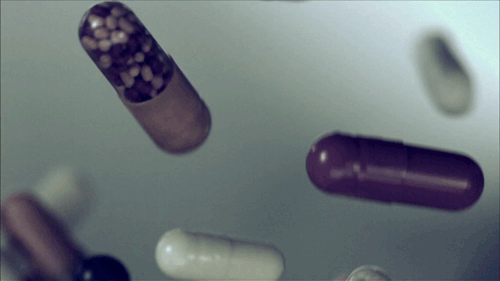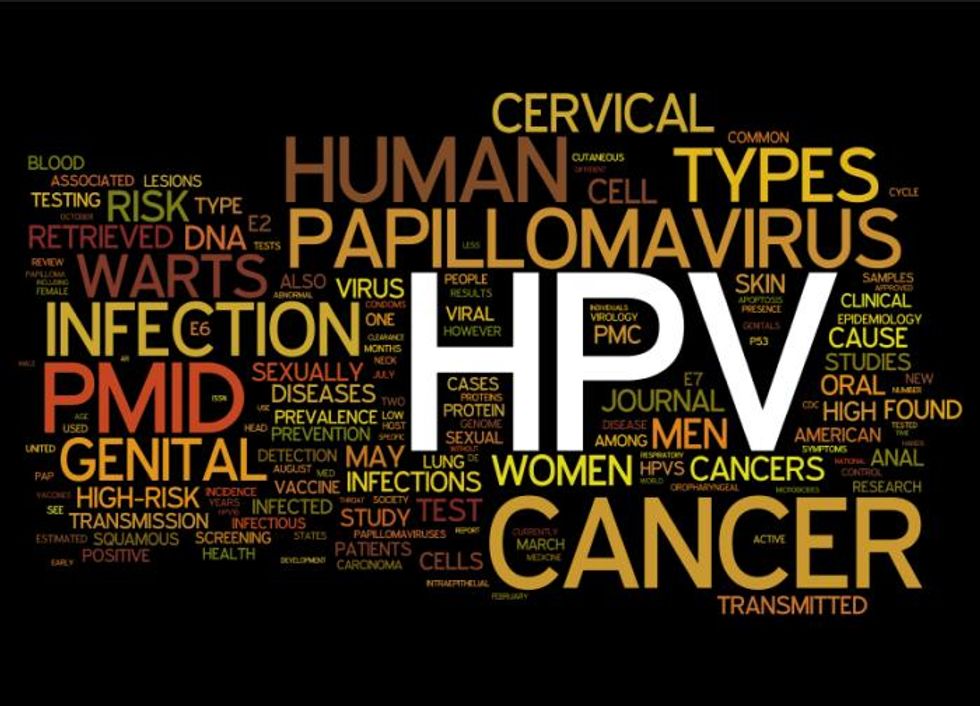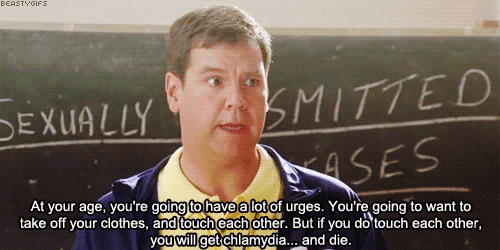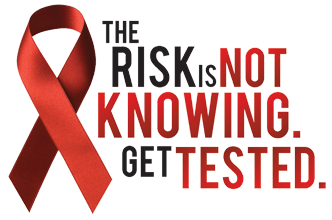Before I get started, I am in no way condoning unsafe sex practices nor do I think we shouldn't treat sexually transmitted diseases as an important issue. Instead, I am advocating that we put an end to the scarlet 'A' we give to people with STDs because society treats them as a consequence of promiscuity when that it not always the case.
Oftentimes, the social stigma behind the STD is more damaging than the STD itself because people fear what their peers will think of them if they find out that they have an STD. This often creates a mental and emotional toll, leading to stress, depression and isolation. If we can change the stigma, people won't be so afraid of getting tested and will feel safer and more comfortable disclosing with their peers and partners, and in turn, we can decrease the spread of STDs all while increasing our awareness of them.
1. STDs don't discriminate
Anyone can get an STD, not just people with multiple partners. People have been known to get an STD the first time they had sex. It doesn't matter if you're rich or poor, black or white, we all have the same chances of contracting an STD. It is estimated that at least half of sexually active teens and young adults will get an STD by the time they're 25.
However, women are more vulnerable to the effects of an STD infection due to their anatomy. Vaginas are a good environment for bacteria to grow and the lining of the vagina is thinner and more delicate than the skin of a penis, therefore it's easier for bacteria and viruses to pass through—and cause infection.
2. STDs don't always match what you saw in Sex Ed. classes.
Most of us grew up taking Sex Ed. classes, but it seemed as though all those classes taught us was that we need to use condoms, take birth control, and stay away from STDs. Sex Ed. classes have the tendency to tell you about worst-case scenarios. They scarred us by showing us photos where it seemed like something was taking over someone's genitals when in reality, most STDs don't have any symptoms or if they do, they're mild, and when there are symptoms, they usually don't become severe as long as they are properly treated within a timely manner. Which is why it is so important to get tested often and alert your partners if you get diagnosed with an STD.
3. All STDs are treatable.
While not all STDs are curable, all are treatable (or preventable). Bacterial infections such as chlamydia, gonorrhea, and syphilis, as well as the parasitic STD, trichomoniasis, can be treated with antibiotics that will eventually clear up the infections. The other parasitic STDs (crabs and scabies) can be treated with prescribed ointments and lotions. Viral STDs such as HIV/AIDS and HSV can be treated with antiviral medications. These antivirals reduce the amount of the virus in a person’s body as well as reduce the risk of transmission to another person. Not to mention, there is currently a vaccine in trials that helps treat HSV-2 and if it gets approved by the FDA, it should be in the market within the next few years. The only STD that does not necessarily have a treatment is HPV, however there are procedures that can help treat cancerous HPV and genital warts. In addition, there is an HPV vaccine (Gardasil) that protects against some strains of the virus. Young women can get the HPV vaccine through age 26, and young men can get vaccinated through age 21.
All STDs can be prevented to a certain extent with the use of condoms and dental dams.
4. HPV is the most common STD, yet we don't talk about it enough.
According to the CDC, nearly all sexually active people will have at least one of the 40 strains of the Human Papillomamavirus (HPV) at some point in their lives. Approximately 90 percent of HPV cases are cleared by the immune system within 2 years, but cases that don’t clear up on their own can lead to cancers of the cervix, vulva, and vagina in women, cancer of the penis in men, or cancers of the anus and back of the throat, including the base of the tongue and tonsils (oropharynx) in both men and women. HPV can also cause genital warts, although those strains do not lead to cancer.
Unfortunately, there is no HPV test recommended for men, therefore most will never know that they have it, which makes it easier for them to unknowingly pass it on to their partners. This means that it is that much more important that women get regular pap smears with their gynecologists. Fortunately, there is an HPV vaccine that protects against the virus (see #3).
5. Some of the most curable STDs can be the most detrimental to your health.
If left untreated, bacterial infections such as chlamydia, gonorrhea, and syphilis can lead to long-term health complications and in rare cases, even death. Chlamydia is the most common curable sexually transmitted disease, as well as one that is most often asymptomatic, yet left untreated it can lead to pelvic inflammatory disease (PID) which can cause severe pain, infertility, or serious complications during pregnancy. Untreated gonorrhea in women can lead to similar issues. Men with untreated gonorrhea can develop inflammation of the tube that helps carry sperm, which can also lead to infertility. Syphillis can have some of the worse complications of the three if left untreated. They include brain damage, paralysis, blindness, and dementia. In extreme cases, any of these STDs can be fatal.
So make sure you get screened for STDs regularly, and even more frequently if you have multiple sex partners or if you engage in unprotected sex.
6. You probably have herpes.
Approximately 75%-80% of Americans carry at least one Herpes Simplex Virus (Type 1 or 2), whether orally or genitally, however 8 out of 10 people with HSV are not aware that they are infected because they are either asymptomatic (have no symptoms) or their symptoms are so mild they don’t notice or recognize them. This means that most people are infecting others because they are not aware that they have the virus and are not taking the proper precautions.
HSV-1 can live on a person’s mouth in the form of cold sores—yes, all cold sores are a result of HSV-1—and fever blisters on the mouth or on the genitals, and it can be transmitted from mouth to genitals and vice versa. HSV-2 lives primarily on the genital area and it is almost entirely sexually transmitted from skin-to-skin contact—no, you can’t get herpes from a toilet. People with HSV-1 usually experience less frequent outbreaks and less viral shedding than people with HSV-2, but outbreaks of both types typically recur less and become less severe over time.
7. But even if you do, it’s NOT a death sentence.
Out of all the STDs, herpes is one of the least detrimental to your health because it does not cause any problems in healthy adults, which is why doctors usually don’t test for it unless a person is displaying noticeable symptoms. In most cases, herpes is just an inconvenient skin condition, so why is herpes treated like a death sentence? Arguably, it’s probably because there isn’t a cure for it (yet), it’s contagious, and for years, it has been the butt of all STD jokes, therefore people are afraid of getting in contact with it. Although, little do most of us know, HSV can be treated and controlled.
Research suggests that if contact is avoided during outbreaks, women have a 4% rate of transmission per year to a male partner during unprotected sex, whereas males have an 8% rate of transmission per year to a female partner during unprotected sex. Condoms have been shown to reduce the risk by half, making it a 2% rate of transmission from female-to-male and a 4% rate of transmission from male-to-female. If partners use condoms and suppressive antiviral medications, the rates of transmission reduce to 1% female-to-male and 2% male-to-female. That is nearly equivalent to the chances a woman has of becoming impregnated with the use of a condom.
8. You can’t “catch” AIDS.
You can only develop AIDS if you have HIV, which usually doesn’t develop into AIDS with the proper treatment and a healthy lifestyle. The human immunodeficiency virus (HIV) is a virus that progressively attacks the immune system, making it harder to fight off infections and diseases. HIV destroys a type of white blood cell called a T-helper cell—also known as CD4 cells—and replicates itself inside them. There are two types of the virus: HIV-1 (the most common type found worldwide) and HIV-2 (found mainly in Western Africa, with some cases in India and Europe). If left untreated, the virus can develop into AIDS (acquired immune deficiency syndrome) within 10-15 years. A person with AIDS may develop a wide range of other health conditions including: pneumonia, thrush, fungal infections, TB, toxoplasmosis and cytomegalovirus, as well as have an increased chance of developing cancer or brain illnesses. Although HIV is a lifelong infection, with early detection and proper treatment, a person with HIV can lead a long, healthy life.
HIV is only known to be transmitted through semen, blood, vaginal and anal fluids and breast milk. It cannot be transmitted through saliva, sweat, or urine. Because of the this, the most common way of transmitting HIV is through unprotected vaginal or anal sex, although it can also be transmitted through the use of non-sterile needles or from mother-to-child during pregnancy, birth, or breastfeeding.
HIV often has few or no symptoms in the early stages and the only way to know is if you get tested.
9. There is NO shame in being safe and sexually active.
People often feel embarrassed to buy condoms, women often feel self-conscious of taking their birth control in public, and people often feel ashamed of disclosing their sexual history. Why?
Why is it that as a society that preaches safe sex practices, we shame those that practice them? This leads people to practice unsafe sex because they fear purchasing contraceptives or medications that could make their sexual activity all that safer. Instead of getting tested and/or disclosing with their partners, people are keeping things secret while possibly not taking the proper precautions to protect their partner from transmission.
Stop the shaming. Change the stigma. Become informed.
By doing this, we’ll create healthier sex lives for all of us.
So the next time someone discloses that they have an STD, you should respect their privacy and thank them for being considerate of your health and giving you the option of whether you want to put yourself at risk or not. And maybe reconsider saying that herpes joke next time because you might just be hurting the feelings of someone you care about.


















 Going to the cinema alone is good for your mental health, says science
Going to the cinema alone is good for your mental health, says science












 women in street dancing
Photo by
women in street dancing
Photo by  man and woman standing in front of louver door
Photo by
man and woman standing in front of louver door
Photo by  man in black t-shirt holding coca cola bottle
Photo by
man in black t-shirt holding coca cola bottle
Photo by  red and white coca cola signage
Photo by
red and white coca cola signage
Photo by  man holding luggage photo
Photo by
man holding luggage photo
Photo by  topless boy in blue denim jeans riding red bicycle during daytime
Photo by
topless boy in blue denim jeans riding red bicycle during daytime
Photo by  trust spelled with wooden letter blocks on a table
Photo by
trust spelled with wooden letter blocks on a table
Photo by  Everyone is Welcome signage
Photo by
Everyone is Welcome signage
Photo by  man with cap and background with red and pink wall l
Photo by
man with cap and background with red and pink wall l
Photo by  difficult roads lead to beautiful destinations desk decor
Photo by
difficult roads lead to beautiful destinations desk decor
Photo by  photography of woman pointing her finger near an man
Photo by
photography of woman pointing her finger near an man
Photo by  closeup photography of woman smiling
Photo by
closeup photography of woman smiling
Photo by  a man doing a trick on a skateboard
Photo by
a man doing a trick on a skateboard
Photo by  two men
two men  running man on bridge
Photo by
running man on bridge
Photo by  orange white and black bag
Photo by
orange white and black bag
Photo by  girl sitting on gray rocks
Photo by
girl sitting on gray rocks
Photo by  assorted-color painted wall with painting materials
Photo by
assorted-color painted wall with painting materials
Photo by  three women sitting on brown wooden bench
Photo by
three women sitting on brown wooden bench
Photo by 
 Photo by
Photo by  Photo by
Photo by  Photo by
Photo by  Photo by
Photo by 


 people sitting on chair in front of computer
people sitting on chair in front of computer











